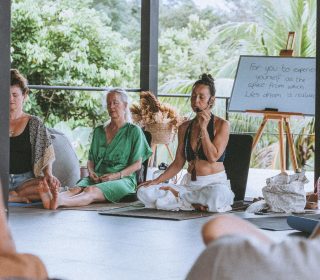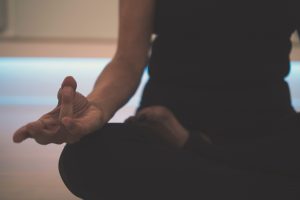Andy Puddicombe on Headspace, life and bringing meditation to the masses

–
You don’t have to be a Buddhist to meditate – it is not all about sitting in the Lotus position and chanting
+
It will improve relationships – less conflict in your mind will lead to less conflict with others
A BIT ABOUT ME
It all started on Christmas Eve, 1992, when a drunk driver ploughed into me and my friends and two of them were killed. A short time later, my stepsister was killed while cycling, and my ex-girlfriend died during heart surgery. I felt overwhelmed with emotion and by life’s big questions. One afternoon, I thought, ‘I really want to become a Buddhist monk’. So I left uni, sold my possessions, and went off to the Himalayas.
BUSTING MYTHS
With the Headspace programme, I really wanted to share the knowledge I’d built up during my time as a monk so others could benefit. I wanted to make meditation accessible, relevant and beneficial for as many people as possible – to get away from the idea that it’s just a spiritual practice for Buddhists. We now have seven million users in 200 countries.
COMPASSION WITHIN
Meditation doesn’t ask you to believe in anything. Inner dialogue is based on opinions, beliefs and judgements. Having a busy mind, I struggled to let go of thought to experience something beyond it.
It isn’t usually linked to kindness, but meditation teaches you to be kind to yourself. That compassion filters through to others.
THE ANTIDOTE
Due to the current pace of life, the mind is experiencing a potentially harmful degree of pressure, particularly for those in high-intensity work environments. People assume this kind of stress is simply part of life, but meditation shows us how to live more skilfully.
VIEW POINT
True peace of mind is always there, you just have to learn how to find it. When this idea becomes part of your everyday experience, your perspective changes and you start to feel differently about the world. You begin to experience a less reactive and more responsive mind. But the biggest change comes with relationships, which inevitably improve as your mind becomes more open.
SPREAD THE LOVE
A limited mind is a limited practice, so think big. When meditating, remember it’s not just for you. It has a ripple effect.
THE OUTCOME
Research has found meditation promotes ‘divergent thinking’ – a type of thinking that allows new ideas to be generated. It also activates the ‘rest and digest’ part of our nervous system, which helps with stress management, improves sleep and aids creativity.
3 STEPS TO GET STARTED
Just do it
Meditation only works if you actually do it. For just 10 minutes each day, sit down, close your eyes, and focus on your breath, letting thoughts float by. You can do it anywhere, anytime. It’s portable stress relief.
Make it a habit
Just like any other skill, meditation requires practise. It’s not about doing as much as possible, but rather regular, consistent practise which will allow your brain to rewire itself. Anchor it to your morning routine.
Don’t judge
Yourself, that is. A common worry is ‘Am I doing this right?’ Try to let go of judgement and just sit in meditation.
Even if nothing else, it’s a great way to practise non-judgement.
Read more: how to meditate (and why it’s not as hard as it seems)











